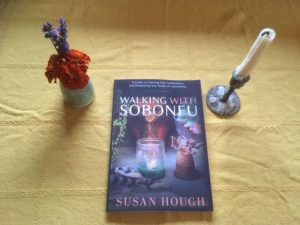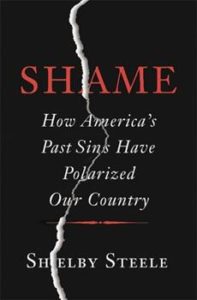
Books we’re reading
 This time of year, I love a good book. I’m currently reading a book about a beloved ancestor — Walking with Sobonfu by Susan Hough. It’s an intimate read about Susan’s journey as student and friend of Sobonfu Somé, one of my teachers and a former SOIL instructor and grief ritual facilitator. Susan shares fun and interesting stories about her time journeying with Sobonfu as well as lots of information about very useful and accessible rituals I can engage in daily. I recommend it to anyone who wants to reclaim their authenticity and deepen their sense of community.
This time of year, I love a good book. I’m currently reading a book about a beloved ancestor — Walking with Sobonfu by Susan Hough. It’s an intimate read about Susan’s journey as student and friend of Sobonfu Somé, one of my teachers and a former SOIL instructor and grief ritual facilitator. Susan shares fun and interesting stories about her time journeying with Sobonfu as well as lots of information about very useful and accessible rituals I can engage in daily. I recommend it to anyone who wants to reclaim their authenticity and deepen their sense of community.
I asked around the village to see what other villagers are reading. Deborah Clark recommended Helen Zuman’s book Mating in Captivity, A Memoir. It’s about her experiences in the Zendik Farm cult, which she didn’t know was a cult until she was in it for a while and discovered that her autonomy and self-worth were being eroded by the cult leaders. You might call it a cautionary tale of someone who was very interested in community life and looking for love, but found a distorted version with the Zendiks.
Deborah reports “I’ve actually read the book twice, and it’s really well written — she conveys what happened and her process with a satisfying balance of juicy description and economy: never a wasted word. Somehow she clearly speaks her truth while maintaining some objectivity, portraying the cult leaders as humans and not monsters. It was particularly interesting to me because I had read about the Zendiks and was curious about their ‘community,’ and also knew someone else who had gotten out (he was there at the same time Helen was). It was especially juicy the second time I read it, because by then I had gotten to know Helen as a dear friend, but I think the book would be of interest to anyone who is interested in the topics of community, cults, and personal transformation.”
Spoiler alert: Helen survived the cult, did some good healing and processing, or as she would say “composting” of her experiences, and went on to be a successful writer, activist, and entrepreneur, and now has a regular podcast called Chocolate Church.
 Bruce Johnston is reading a book called Shame: How America’s Past Sins Have Polarized Our Country by Shelby Steele.
Bruce Johnston is reading a book called Shame: How America’s Past Sins Have Polarized Our Country by Shelby Steele.
Bruce reports “The book is about how America’s ‘culture wars’ began in the 1960s, when America finally became accountable for its treatment of Black Americans, and then for imperialism, sexism, and so forth. The book argues a schism in American life has come from that awareness and the loss of moral authority that white America experienced as a consequence of that awareness. The book contends that this cultural war has prevented sensible policy in many areas of life and has generated an avoidance of principled discussion around sensitive topics like race and gender, mostly because American institutions still feel that they lack the moral authority to do so. I recommend it because it is a point of view on these topics that I rarely hear: unconventional, delightfully practical, humanistic, and relatively free of ideology.”
And our elder Arjuna da Silva is reading a book that’s 50 years old, but not yet known — The Origin of Consciousness in the Breakdown of the Bicameral Mind by Julian Jaynes. She says that it’s a radical and amazing investigation of the more likely evolution of human thought and consciousness based on ancient texts that have apparently rarely been seen in these lights. She recommends it for people interested in evolution, consciousness, or healing.
What are you reading? If there’s a book you’d like to share, please share it in the comments.
Arjuna da Silva, NikiAnne, Sobonfu Somé
FairyAnn
i just stated reading THE BALANCE POINT: A MISSING LINK in Human Consciousness by Joseph Jenkins, the author of the Humanure Handbook. I discovered it when I went to his web-place to order a case of ‘bibles’ to promote the Church of the Holy Shit. It’s a fun mystery based on actual events and real science. It’s a fun ride as the protagonist has no idea about any of the things he is choosing to experience, so far Wiccan sacred circles, sweat lodges….. loving it. It’s been a minute since I’ve read fiction.
Mark D. Homer
I am reading a book about the relationship between the American Jewish community, especially Rabbi Wise, and Franklin D. Roosevelt during the 1930″s and WWII.
Roosevelt, it is clear, was quite anti-Semitic in his Upper Class Hudson Valley way, and did nothing during the Holocaust (except when prodded to intervene with the Vichy regime in Africa), other than meet on a first name basis with Wise and issue boiler-plate, vague statements.. The State Department was extremely anti-Semitic. Unfortunately, American Jewish leadership was afraid to push for action or complain, lest it “harm the war effort” or rouse the public against the Jewish community. The conservative German Jewish community, especially the American Jewish Committee, was particularly useless. Not a fast read, but very well written, and it clarifies a large fuzzy area in my mind.
Rafael Medoff, “The Jews Should Keep Quiet” (2019)
Vicki Vessier
I’m reading “The Man Who Killed the Deer” by Frank Waters. It’s an old book. My paperback edition was printed in 1942 as a celebration of the 20th year of publication! I chose it to learn about this place where I live. It is a novel about Pueblo Indian life. I live in a village in New Mexico. Within 5 miles of my old adobe home there are the tribal lands of 5 tribes. The land trust I live on was long ago the home of a tribe that assimilated into two of those tribes long ago with the Spanish conquest. The center of their village, was just down the road. I am dedicating my reading this winter to learn more about this place and the people that were here before in order to gain more of a connection to the soul of this land and more of an understanding of the history of my neighbors, whom I respect deeply.
Mark Homer
Sarah Chayes, “On Corruption in America: And What is at Stake (2020) Anne Applebaum and Timothy Snyder have written similar books. Chayes fleshes out what in less thorough and capable hands would easily be dismissed as a paranoid rant. One sentence summary is that all the rich folks are corrupt whatever their label or sales pitch,; they are getting internationally more connected and more openly authoritarian towards the rest of us.
Sounds like Alex Jones, but Sarah Chayes has the detailed historic goods and does a stunning job of connecting the dots into chunks, and chunks into interweaving narratives. (Btw, her father was a professor of law at Harvard, which apparently made for some interesting childhood training; she writes history like a legal brief.) This is not an uplifting book, but I feel like I had a clearer lens with which to view the world.
Laura Nardella
I am reading “The God Code” by Gregg Braden. This is a fascinatingly, brilliant, piece of literature that combines science and religion and makes sense.
I am alone in this world, many have died, many contacts have been lost with time and age.
I am looking for a place where I belong. I shelter myself from the world and all of the ways, I do not understand. At the same time, I live in, what is turning into a city, on the north shore of the east coast of Massachusetts. A place, where everyone lives within inches of one another’s front door and no one speaks to each other.
I am a woman of God and I live in a setting where there is no love. Could I find it there?
Sandy Weiner
I just read, The Bear is My Father, by Bear Heart. It is an easy read. with nuggets of wisdom of Indian culture and life throughout. Moving to a more complex read After One Hundred Winters: In search of Reconciliation on American’s Stolen Lands, by historian Margaret Jacobs.
I am very attracted to Indian culture and how to reconcile our history, heal our present and co-create from the heart our future.. I don’t even have the words, as yet, to define what I mean by reconcile or heal or what future may look like.